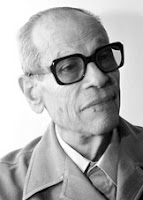Know Your Laureate of African Origin Part III - Naguib Mahfouz
 |
| Naguib Mahfouz |
We continue with the weekly highlight of African Nobelists in Literature. Two years after Soyinka's Nobel award, another African from the North, Egypt, won in 1988.
Naguib Mahfouz, (11 December 1911 - 30 August 2006) started writing at the of 17, publishing his first novel five years later in 1933. Naguib wrote prolifically, writing ten more books, before the Egyptian revolution in 1952 where he took a short leave of writing. Even then, in 1953 he published one novel and in 1957 published what has been referred to as the Cairo Trilogy - Between-the-Palace, Palace of Longing and Sugarhouse. These books which marked the second phase of his writing career was marked with political innuendos using symbolisms and allegory.
As an Egyptian writer, Naguib Mahfouz is considered, along with Tawfiq, el-Hakim, as the first of contemporary writers of Arabic Literature to explore themes of existentialism. He published over 50 novels, 350 short stories, dozens movie scripts and five plays over a career spanning over 70 years. At the time of his death, and four years on, he is the only Arabic-language writer to have won the Nobel Laureate in Literature.
Some of his works:
- Old Egypt (1932)
- Whisper of Madness (1938)
- Mockery of the Fates (1939)
- Rhadopis of Nubia (1943)
- The Struggle of Thebes (1944)
- Modern Cairo (1945)
- Khan El-Kahlili (1945)
- Midaq Alley (1947)
- The Mirage (1948)
- The Beginning and The End (1950)
- Cairo Trilogy (1956-57)
- Palace Walk (1956)
- Palace of Desire (1957)
- Sugar Street (1957)
- Children of Gebelawi (1959)
- The Thief and the Dogs (1961)
- Quail and Autumn (1962)
- God's World (1962)
- The Search (1964)
- Zaabalawi (1963)
- The Search (1964)
- The Beggar (1965)
- Adrift on the Nile (1966)
- Miramar (1967)
- The Pub of the Black Cat (1969)
- A story without a beginning or an ending (1971)
- The Honeymoon (1971)
- Mirrors (1972)
- Lover under the rain (1973)
- The Crime (1973)
- al-Karnak (1974)
- Respected Sir (1975)
- The Harafish (1977)
- Love above the Pyramid Plateau (1979)
- The Devil Preaches (1979)
- Love and the Veil (1980)
- Arabian Nights and Days (1981)
- Wedding Song (1981)
- One hour remains (1982)
- The Journey of Ibn Fattouma (1983)
- Akhenaten, Dweller in Truth (1985)
- The Day the Leader was Killed (1985)
- The Hunger (Al-Go'a) (1986)
- Speaking the morning and evening (1986)
- Fountain and Tomb (1988)
- Echoes of an Autobiography (1994)
- Dreams of the Rehabilitation Period (2004)
- The Seventh Heaven (2005)



Wow, over 50 novels? That is impressive! I liked the first book of the Cairo Trilogy so will be looking forward to reading more at some point.
ReplyDeleteI read your review of it. He has an impressive oeuvre.
ReplyDeleteHeard so much about the Cairo Trilogy but never read him. I hope to do so someday. This is an insightful piece!
ReplyDeleteOn my TBR list.
ReplyDelete